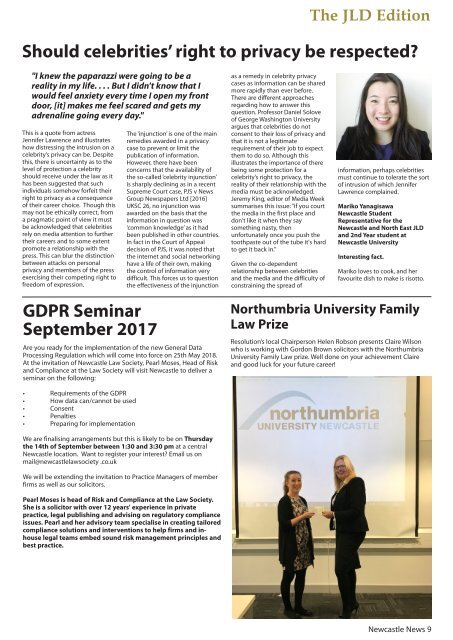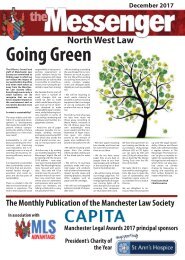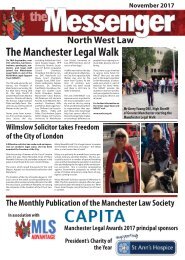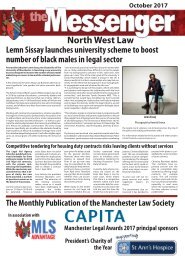Newcastle News June 2017
Create successful ePaper yourself
Turn your PDF publications into a flip-book with our unique Google optimized e-Paper software.
The JLD Edition<br />
Should celebrities’ right to privacy be respected?<br />
"I knew the paparazzi were going to be a<br />
reality in my life. . . . But I didn't know that I<br />
would feel anxiety every time I open my front<br />
door, [it] makes me feel scared and gets my<br />
adrenaline going every day."<br />
This is a quote from actress<br />
Jennifer Lawrence and illustrates<br />
how distressing the intrusion on a<br />
celebrity’s privacy can be. Despite<br />
this, there is uncertainty as to the<br />
level of protection a celebrity<br />
should receive under the law as it<br />
has been suggested that such<br />
individuals somehow forfeit their<br />
right to privacy as a consequence<br />
of their career choice. Though this<br />
may not be ethically correct, from<br />
a pragmatic point of view it must<br />
be acknowledged that celebrities<br />
rely on media attention to further<br />
their careers and to some extent<br />
promote a relationship with the<br />
press. This can blur the distinction<br />
between attacks on personal<br />
privacy and members of the press<br />
exercising their competing right to<br />
freedom of expression.<br />
The ‘injunction’ is one of the main<br />
remedies awarded in a privacy<br />
case to prevent or limit the<br />
publication of information.<br />
However, there have been<br />
concerns that the availability of<br />
the so-called ‘celebrity injunction’<br />
is sharply declining as in a recent<br />
Supreme Court case, PJS v <strong>News</strong><br />
Group <strong>News</strong>papers Ltd [2016]<br />
UKSC 26, no injunction was<br />
awarded on the basis that the<br />
information in question was<br />
‘common knowledge’ as it had<br />
been published in other countries.<br />
In fact in the Court of Appeal<br />
decision of PJS, it was noted that<br />
the internet and social networking<br />
have a life of their own, making<br />
the control of information very<br />
difficult. This forces us to question<br />
the effectiveness of the injunction<br />
as a remedy in celebrity privacy<br />
cases as information can be shared<br />
more rapidly than ever before.<br />
There are different approaches<br />
regarding how to answer this<br />
question. Professor Daniel Solove<br />
of George Washington University<br />
argues that celebrities do not<br />
consent to their loss of privacy and<br />
that it is not a legitimate<br />
requirement of their job to expect<br />
them to do so. Although this<br />
illustrates the importance of there<br />
being some protection for a<br />
celebrity’s right to privacy, the<br />
reality of their relationship with the<br />
media must be acknowledged.<br />
Jeremy King, editor of Media Week<br />
summarises this issue: “if you court<br />
the media in the first place and<br />
don't like it when they say<br />
something nasty, then<br />
unfortunately once you push the<br />
toothpaste out of the tube it's hard<br />
to get it back in."<br />
Given the co-dependent<br />
relationship between celebrities<br />
and the media and the difficulty of<br />
constraining the spread of<br />
information, perhaps celebrities<br />
must continue to tolerate the sort<br />
of intrusion of which Jennifer<br />
Lawrence complained.<br />
Mariko Yanagisawa<br />
<strong>Newcastle</strong> Student<br />
Representative for the<br />
<strong>Newcastle</strong> and North East JLD<br />
and 2nd Year student at<br />
<strong>Newcastle</strong> University<br />
Interesting fact.<br />
Mariko loves to cook, and her<br />
favourite dish to make is risotto.<br />
GDPR Seminar<br />
September <strong>2017</strong><br />
Are you ready for the implementation of the new General Data<br />
Processing Regulation which will come into force on 25th May 2018.<br />
At the invitation of <strong>Newcastle</strong> Law Society, Pearl Moses, Head of Risk<br />
and Compliance at the Law Society will visit <strong>Newcastle</strong> to deliver a<br />
seminar on the following:<br />
Northumbria University Family<br />
Law Prize<br />
Resolution’s + local Chairperson + Helen + Robson + presents + Claire Wilson<br />
who + is working + with + Gordon + Brown + solicitors + + with + the + + Northumbria + + +<br />
+ University + Family + + Law prize. + Well done + + on your + achievement + + + + Claire + +<br />
+ + + + + + + ++<br />
and good luck for your future career!<br />
• Requirements of the GDPR<br />
• How data can/cannot be used<br />
• Consent<br />
• Penalties<br />
• Preparing for implementation<br />
We are finalising arrangements but this is likely to be on Thursday<br />
the 14th of September between 1:30 and 3:30 pm at a central<br />
<strong>Newcastle</strong> location. Want to register your interest? Email us on<br />
mail@newcastlelawsociety .co.uk<br />
We will be extending the invitation to Practice Managers of member<br />
firms as well as our solicitors.<br />
Pearl Moses is head of Risk and Compliance at the Law Society.<br />
She is a solicitor with over 12 years' experience in private<br />
practice, legal publishing and advising on regulatory compliance<br />
issues. Pearl and her advisory team specialise in creating tailored<br />
compliance solutions and interventions to help firms and inhouse<br />
legal teams embed sound risk management principles and<br />
best practice.<br />
<strong>Newcastle</strong> <strong>News</strong> 9

















